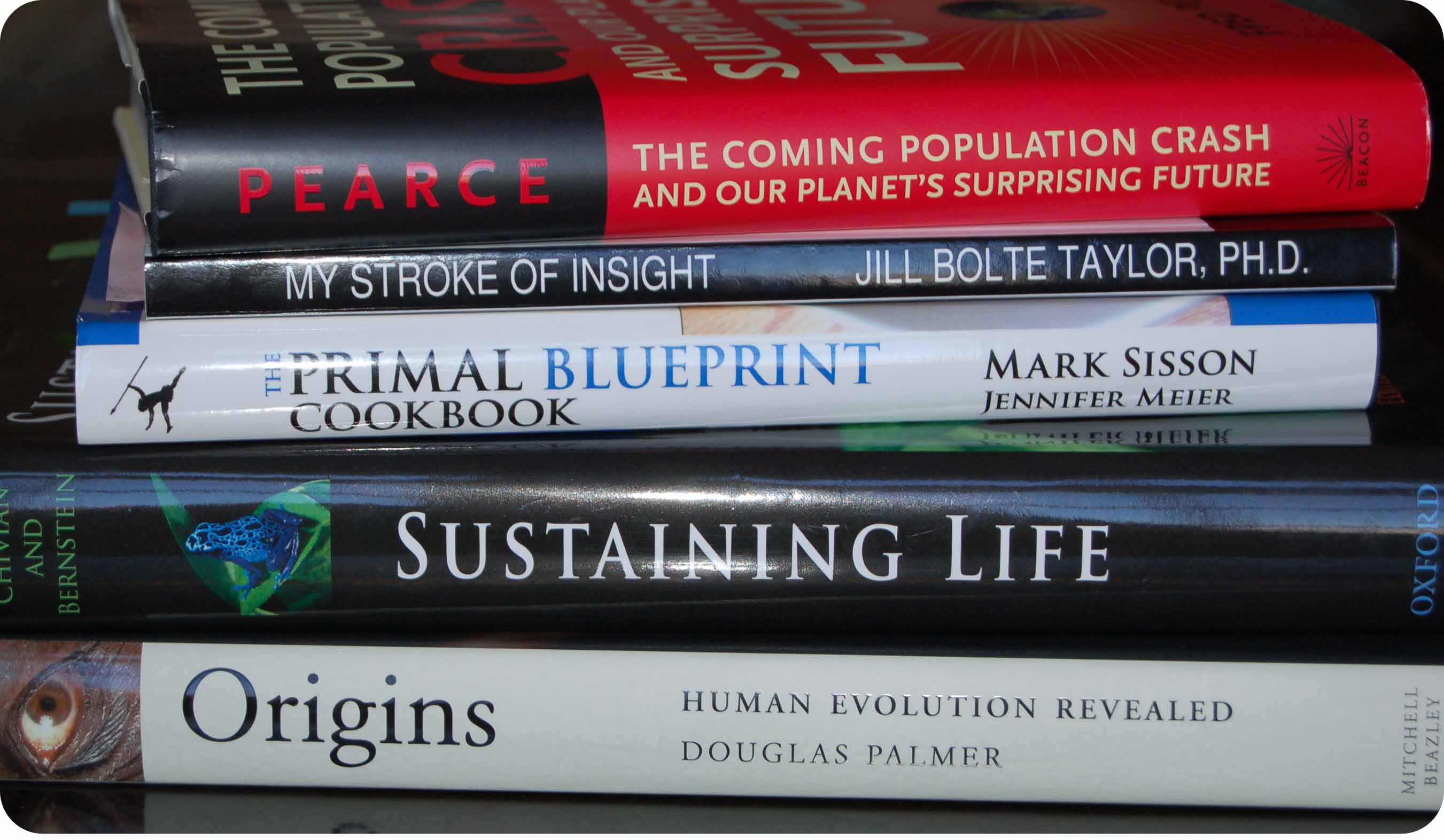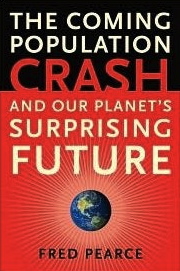Books: 5 Recent Selections
 Thursday, December 23, 2010 at 10:12AM
Thursday, December 23, 2010 at 10:12AM  These 5 books occupied my leisure reading over the past few months (I did not work for 5 weeks following the cycling crash). Subjects include the coming population crash (yes, population crash), the story of a neuroscientist who lost part of her mind following a stroke and how she recovered, a primal cookbook, an extensive treatise on biodiversity and its impact on human health, and a synthesis of the origin of humankind.
These 5 books occupied my leisure reading over the past few months (I did not work for 5 weeks following the cycling crash). Subjects include the coming population crash (yes, population crash), the story of a neuroscientist who lost part of her mind following a stroke and how she recovered, a primal cookbook, an extensive treatise on biodiversity and its impact on human health, and a synthesis of the origin of humankind.
The Coming Population Crash and our Planet’s Surprising Future
Fred Pearce
 One may think the global human population will keep growing over the next century and bring the Earth to its knees. Well, it is still growing, and yes, we may not make it comfortably through the coming peak of about 9 billion inhabitants, but by mid-century, the Earth’s population is going down. Why? Not enough babies. “Mothers today have fewer than half as many offspring as their own mothers.” For some European countries the birth rate has declined so rapidly they are not replacing their indigenous population and will grow by immigration.
One may think the global human population will keep growing over the next century and bring the Earth to its knees. Well, it is still growing, and yes, we may not make it comfortably through the coming peak of about 9 billion inhabitants, but by mid-century, the Earth’s population is going down. Why? Not enough babies. “Mothers today have fewer than half as many offspring as their own mothers.” For some European countries the birth rate has declined so rapidly they are not replacing their indigenous population and will grow by immigration.
In this often-tedious book, Pearce, a former editor of the New Scientist and currently an environmental consultant, discusses the causes for the coming worldwide population decline and the associated politics. The message is convincing: after peaking at 8 to 9 billion by mid-century, the population will decrease quickly.
(Salon interviewed Fred Pearce. Other populations notes are at Think Again: Global Aging and Seven Billion.)
My Stroke of Insight: A Brain Scientist’s Personal Journey
Jill Bolte Taylor, PhD
Loaned to me by a friend, this fascinating and hopeful book describes the experience of a neuroscientist watching herself lose and, over months and years, regain her mind. The stroke was sudden: a large hemorrhage in the left cerebral hemisphere due to the rupture of a congenital clump of blood vessels. She was at home when her mind slowly came apart. Using some of the remaining, yet sputtering, centers in her brain, she was able to call for help. The loss of the ego-controlling left hemisphere led her to perceive herself as a fluid, losing her sense of physical separation from her surroundings. A seductive “deep inner peace” emanating from her right hemisphere was slowly counterbalanced by the recovering left hemisphere. Through force of will and her mother’s devotion, she rebuilt her life and 8 years later wrote her story.
The book is recommended for anyone interested in learning more about brain function and the give and take between the two cerebral hemispheres that creates our internal world and expresses who we are. The book is invaluable for family and friends of someone with a stroke. For health professionals, it serves as a reminder that while the cognitive brain of a stroke survivor may be difficult to reach with our neurologic questioning, the emotional brain may still perceive the soft outline of our kindness, manner, and voice and determine whether our approach is to be respected or not.
The Primal Blueprint Cookbook
Mark Sisson with Jennifer Meier
Mark Sisson is well known for MarksDailyApple.com web site and for providing years of practical health advice delivered in a delightful style. This former marathoner, and now a developer of health supplements, books and other media, has, with Jennifer Meier, written a beautifully illustrated cookbook published on high quality stock. The book is filled with primal recipes for every practicing or aspiring “Grok”. There are chapters on the preparation of meat, offal, fowl and seafood. Egg recipes, primal substitutes, and marinades, sauces, and dressings are also covered. The final chapters describe primal desserts and beverages.
If you are looking for modern Paleolithic recipes, this is a good place to start. The only caveat is to recognize other authors restrict saturated fat and recommend lean meats. Among these are Staffan Lindeberg, author of Food and Western Disease: Health and nutrition from an evolutionary perspective, and Loren Cordain, author of The Paleo Diet.
However, don’t worry about all fats. As Dr. Frank Hu at Harvard School of Public Health notes, the low-fat dictum has been the wrong approach:
The country's big low-fat message backfired. The overemphasis on reducing fat caused the consumption of carbohydrates and sugar in our diets to soar. That shift may be linked to the biggest health problems in America today.
Yes, you can live without pasta, bread, rice, and beans and you will likely be healthier.
Sustaining Life: How Human Health Depends on Biodiversity
Edited by Eric Chivian, M.D., and Aaron Bernstein, M.D.
The editors, both from the Center For Health and the Global Environment, Harvard Medical School, have produced a tour-de-force environmental book. This extensive work required contributions and support of over 300 people. The result is readable text-sized book that clearly outlines the challenges before us.
From the Forward:
The theme of Sustaining Life, in contrast, is that biodiversity matters profoundly to human health, and in almost every conceivable way. The mismanagement and destruction of species and ecosystems ongoing around the world mindlessly, and needlessly, lower the quality of the planet’s natural resources, destabilize the physical environment, and can hasten the spread of human infectious diseases and the invasive enemies of the crops and forests on which our lives depend.
Each multi-authored chapter covers in precise detail much of what is known in the field today. If you want to strengthen your understanding of the critical role of biodiversity in human health, this is a must-have resource. Read the opening chapter (What is Biodiversity?) then select other chapters as desired.
Origins: Human Evolution Revealed
Douglas Palmer
Since reading The Naked Ape by Desmond Morris published in 1972, I have read a number of books on human evolution and have seen the knowledge base explode. We now have Lucy, the Turkana boy (also known as Nariokotome Boy), Homo floresiensis and so many other skeletal remains that the concept of “the missing link” is no longer valid. A broad bush made of multiple hominid lines has been, and continues to be, uncovered - one branch eventually leading to us.
The most recent book, Origins: Human Evolution Revealed by Douglas Palmer, is richly illustrated with high-quality photography, drawings, and maps. In Part 1, Palmer devotes separate chapters, arranged in a temporal sequence, to each hominid. Part 2 deals with the human odyssey beginning with the great African dispersal through the peopling of the eastern and western hemispheres. The origin of tools, culture, and art are also presented.
A great read cover-to-cover, Origins also serves as a quick reference. If you are new to the subject, it may take some time get accustomed to the nomenclature. For all readers, the book provides as a synthesis of the current knowledge and serves as a foundation to understand the next discovery such as this one.


Reader Comments